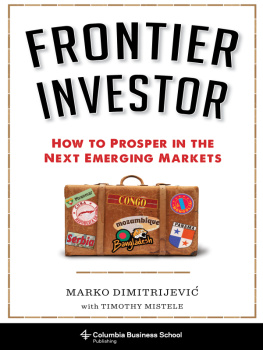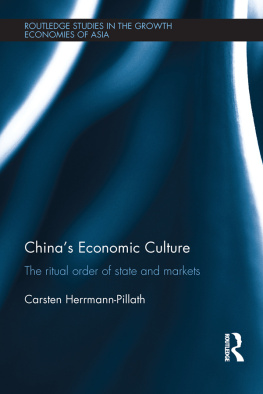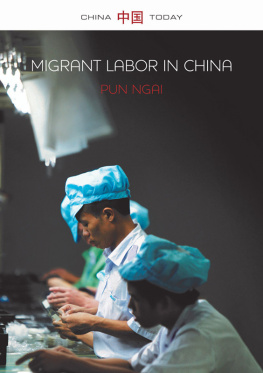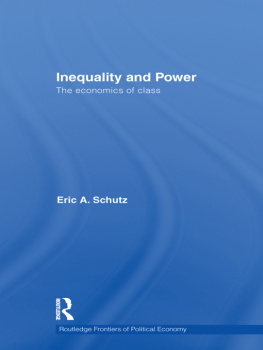Stanford University Press
Stanford, California
2012 by the Board of Trustees of the Leland Stanford Junior University. All rights reserved.
No part of this book may be reproduced or transmitted in any form or by any means, electronic or mechanical, including photocopying and recording, or in any information storage or retrieval system without the prior written permission of Stanford University Press.
Printed in the United States of America on acid-free, archival-quality paper
Library of Congress Cataloging-in-Publication Data
Otis, Eileen M., author.
Markets and bodies : women, service work, and the making of inequality in China / Eileen M. Otis.
pages cm
Includes bibliographical references and index.
ISBN 978-0-8047-7648-6 (cloth : alk. paper)ISBN 978-0-8047-7649-3 (pbk. : alk. paper)
1. Women service industries workersChina. 2. WomenEmploymentChina. 3. WomenChinaSocial conditions. 4. Sex role in the work environmentChina. 5. EqualityChina. I. Title.
HD6073.S452C668 2012
331.481000951dc22 2011010336
Typeset by Westchester Book Composition in Adobe Garamond Pro in 11/13.5
E-book ISBN: 978-0-8047-7835-0
Acknowledgments
An ethnographer is a student of cultural and social worlds. I am grateful to so many people who opened up their lives to me so that I might learn from them. First and foremost, I am indebted to the employees of the service workplaces I studied who patiently entertained my questions, proddings, and sundry curiosities about their experiences. These experiences form the foundation of this book, and I am thankful for the workers thoughtful reflections on the tumultuous changes they have undergone. Many who I interviewed pondered out loud why I would be interested in their labor as a topic for a book. Most could not fathom how their own modest worlds of employment might be compelling to the larger world. My hope is that in this book I have made the case for why these experiences matter.
Without the mentorship of some of the best critical minds and warmest hearts in sociology, this book would not have come to fruition. Vicki Smith was a tireless teacher throughout my training as a sociologist at the University of California, Davis. She read numerous drafts of this book, helping me to see the analytic forest for the descriptive trees in my work. I could not have completed this project without her enthusiastic support, intellectual curiosity, incisive analyses, and, not least of all, good humor and friendship. Fred Block always challenged me to keep an eye on macroeconomic structures as I observed micro-level interactions. When I struggled with finding larger social and political meaning in these observations, it seemed he always provided the theoretical and historical insight that would propel my analysis forward. Nicole Biggart has one of the smartest ears in the business. She had the ability to listen to my endless descriptions of fieldwork and find silver threads of sociological significance. Talking with her often felt like a sociological version of therapy. The late G. William Skinner, renowned China specialist, held me to his uncompromising standards of academic excellence. I am fortunate to have had a mentor who took great care in training his students to practice social science with rigor.
Jan Gouldner has been a stalwart supporter and a central, caring influence in directing my trajectory as a sociologist. My work has also been nurtured by the friendship of Michael Schwartz, who never failed to bubble with enthusiasm when I shared the findings and insights from this study. His questions and suggestions helped me to distill the final comparative analysis of this book. I have shared ideas about this book project from its inception with Elizabeth Rudd, who has offered abundant advice and insight, not to mention invaluable moral support. She attentively edited the final draft of the manuscript. Maxine Craig has also influenced the development of this book with many a theoretical and pragmatic insight. Rudy Sils friendship, insight, and tireless commentary on all things social scientific have sustained me personally and professionally. My sincere thanks go to Yang Guo Cai, professor at Yunnan Nationalities University, who welcomed me into her home for many a meal and provided key on-the-ground introductions and advice that made this project possible. I am indebted to Jackie Armijo for giving me a bed and meals and making me a part of her family during my early fieldwork in Kunming. Both she and Peg Swain generously showed me the ropes of ethnographic research in China. What a gift to have two such able teachers in the field! And thanks to Caleb Southworth for the editing, strategizing, morale building, and timely glasses of whiskey.
This book has benefited from the wisdom of many kind critics who have read and commented on chapters, including Javier Auyero, Dan Buck, Maria Charles, Catheryn Clayton, Robert Culp, Shao Dan, Deborah Davis, Kenneth Foster, Arienne Gaetano, Tom Gold, Gail Hershatter, Bill Hurst, Jerry Jacobs, Jack Katz, Michelle Ladensen, Ching Kwan Lee, Ming-cheng Lo, Susan Mann, Joya Misra, Jen Myhre, Seio Nakajima, Estee Nuewrith, Sean ORiain, Winifred Poster, Carlos Rojas, Preston Rudy, Bindi Shah, Hsiu-Hua Shen, Xiaoling Shu, Eva Skuratovich, May-fair Yang, and Emily Yeh. I am grateful for the opportunity to present the manuscript to Michael Kimmels gender seminar at SUNY Stony Brook and thank him and his students for their perceptive questions and discussion. Thanks to Maram Epstein for help with the finer points of translation, to Amy Braksmajer for sending me articles relevant to this research, and to Clare Yan for helping with some of the transcription. My appreciation also goes to Rebecca Rudd, who helped edit this book. I am most grateful for feedback from two reviewers recruited by Stanford University Press, who engaged thoughtfully with my book manuscript. The manuscript has been ably shepherded through the publication process by Stanford University Press editor Kate Wahl. I am quite lucky to have had the opportunity to work with such a competent, smart, and kind professional. I appreciate all of her careful suggestions and support. Let me also extend appreciation to two institutions that supported the write-up of this research: SUNY Stony Brook and the University of Oregon.
The research for this book has been presented at the University of Massachusetts, Amherst; the University of Oregon; the University of California, San Diego; SUNY Stony Brook; Harvard University Fair-bank Center; the University of Illinois, UrbanaChampaign; the University of California, Davis; and the National University of Singapore. Thanks to the many audiences who listened, queried, and offered commentary on the work. Research and writing of this book was generously supported by the University of California, Pacific Rim Research Program, and the Harvard University Fairbank Center.
My heartfelt appreciation especially goes to Roland Vilett for all of his love and support during the time that I researched and wrote this book. And thanks to Helen Vilett for finding newspaper clippings, documentaries, and books of relevance to my research interests. My parents, Richard and Dorothy Otis, provided a rich, lively, nurturing, and supportive home environment throughout my life. I am most certain that our rousing family debates about the state of the world at the dinner table with my three older brothers, Michael, Stephen, and Frank, inspired my choice of career. My mom has been a best friend and a role model in my life. My dad has always communicated a calm and loving confidence in me. I love you, Mom and Dad. Finally, thanks to Milo Koretsky for being gently by my side during the final stages of this book.











